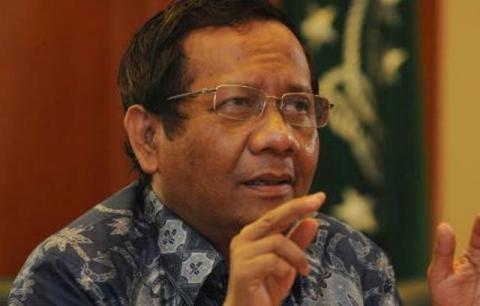NU intellectual urges govt to take measures against China's crackdown on Uighurs
NU Online · Jumat, 21 Desember 2018 | 10:07 WIB
Chairman of the Board of Trustees of Nahdlatul Ulama Scholars Association (ISNU) Mahfud MD said thta Indonesia must use diplomatic measures to stop alleged abuse of Uighur Muslims in Xinjiang China. This is in accordance with Paragraph I of the Preamble of the 1945 Constitution in which the Indonesian people seized independence to protect humanity from all forms of colonialism.
"According to Paragraph I of the Preamble of the 1945 Constitution we struggle for independence to maintain humanity from the humiliation of other humans (colonialism). Indonesia has to use diplomatic channels to stop the suppression of Uighur Muslims," Mahfud MD wrote on his Twitter account on Wednesday (12/19), adding that the government must not keep silent and take firm measures."
He said, the Indonesian government was not enough to just say concerned about what happened to Uighur Muslims in Xinjiang. According to him, the government must do more, by among others, sending a special team to talk with the Chinese government.
"It seems very important that the Indonesian Government not only says concerned but also sends a special team to speak officially with the Chinese government," he continued.
He added, the Indonesian Ministry of Foreign Affairs had played an important role in dealing with the Rohingya cases. On this stand, the ministry should also be able to play the same role in dealing with the alleged abuse of Uighur Muslims.
"Uighur Muslims need protection," he added.
As reported by vox.com, China was sharply criticized for its mass detention of members of the Muslim Uighur community at a United Nations Human Rights Council meeting on Tuesday — but the country pushed back, saying that the condemnation was politically motivated.
Western governments, including those in Europe, the United States, and Canada, had the harshest words for China. The United States chargé d’affaires Mark Cassayre demanded that China “abolish all forms of arbitrary detention” for Uighurs and other Muslims minorities, and that China release the “possibly millions” of individuals detained there.
China’s Vice Foreign Minister Le Yucheng dismissed these and other comments as “politically driven accusations from a few countries that are fraught with biases.”
China has detained as many as 1 million Uighurs in so-called “reeducation centers” and forced them to undergo psychological indoctrination programs — like studying communist propaganda and giving thanks to Chinese President Xi Jinping. Chinese authorities have also reportedly used waterboarding and other forms of torture on the ethnic minority.
The Chinese government, however, claims that the camps are merely vocational and training centers intended to combat extremism, and that they’re teaching detainees useful and valuable skills. On Tuesday, Le, the foreign minister, made similar arguments. “This protects the human rights of the vast majority, while also saving these people,” he said. “It’s another important contribution of China’s to the global counterterror field.”
Members of the UN Human Rights Council from Africa and the Middle East didn’t offer vocal criticism, but the confrontation between China and Western UN member states is the latest development in a long-simmering crisis.
Xinjiang, where about 10 million Uighurs and a few other Muslim minorities live, is an autonomous region in China’s northwest that borders Kazakhstan, Kyrgyzstan, and Mongolia. It has been under Chinese control since 1949, when the communist People’s Republic of China was established.
Uighurs speak their own language — an Asian Turkic language similar to Uzbek — and most practice a moderate form of Sunni Islam. Some activists, including those who seek independence from China, refer to the region as East Turkestan.
Once situated along the ancient Silk Road trading route, Xinjiang is oil- and resource-rich. As it developed along with the rest of China, the region attracted more Han Chinese, a migration encouraged by the Chinese government.
But that demographic shift inflamed ethnic tensions, especially within some of the larger cities. In 2009, for example, riots broke out in Urumqi, the capital of Xinjiang, after Uighurs protested their treatment by the government and the Han majority. About 200 people were killed and hundreds injured during the unrest.
The Chinese government, however, blamed the protests on violent separatist groups — a tactic it would continue to use against the Uighurs and other religious and ethnic minorities across China.
Xinjiang is also a major logistics hub of Beijing’s ambitious Belt and Road Initiative, a trillion-dollar infrastructure project along the old Silk Road meant to boost China’s economic and political influence around the world. Xinjiang’s increasing importance to China’s global aspirations is likely a major reason Beijing is tightening its grip. (Masdar)
Terpopuler
1
Khutbah Jumat: Ramadhan dan Kesempatan yang Tidak Selalu Terulang
2
Keluar Mani yang Tidak dan Membatalkan Puasa
3
Khutbah Jumat: Ramadhan, Melatih Sabar, Memperkuat Syukur
4
Khutbah Jumat: Tiga Kebahagiaan Orang Puasa
5
Kultum Ramadhan: Keutamaan Tarawih dan Witir
6
Khutbah Jumat: 4 Cara Menghidupkan Malam Ramadhan dengan Ibadah
Terkini
Lihat Semua
















